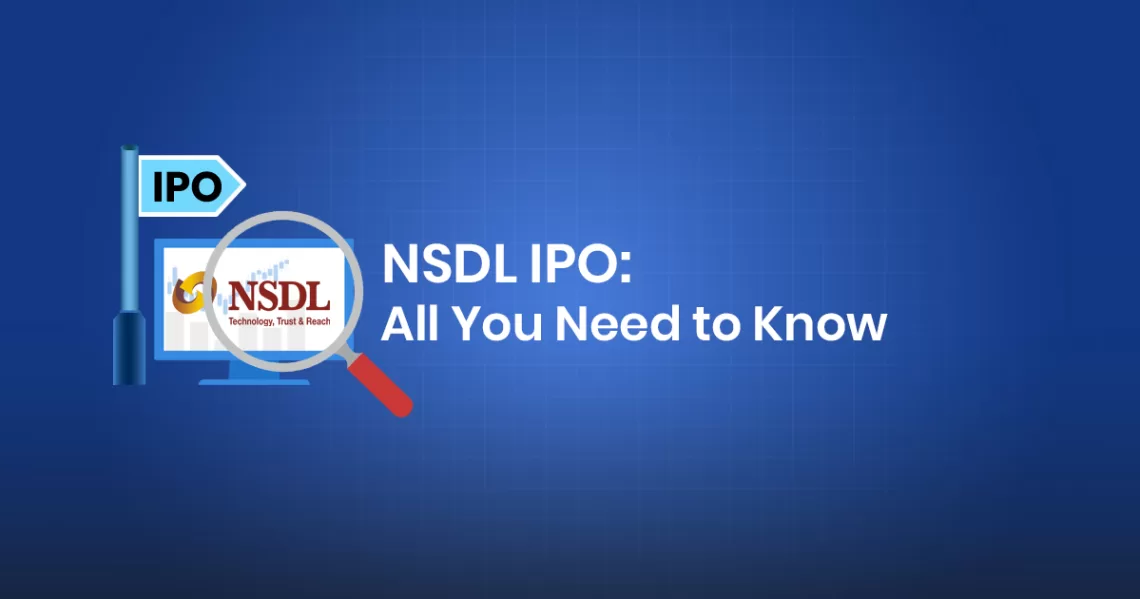Key Takeaways
- IPO Structure: NSDL IPO is a pure Offer for Sale (OFS) of 5.01 crore shares, worth around ₹4,012 crore. No fresh issue of shares.
- Timeline: Subscription ran from July 30 to Aug 1, 2025. Listing expected by Aug 6, 2025 on NSE and BSE.
- Investor Response: The IPO was fully subscribed within hours. Price band set at ₹760–₹800. Analysts see long-term value.
- Peer Comparison: NSDL is India’s largest depository (85%+ market share), while CDSL has shown stronger growth and profitability.
- Strategic Importance: Listing improves transparency, liquidity, and governance, while offering exits to key institutional investors.
Table of Contents
In a country where more than 15 crore people now invest in the stock market, one name has silently safeguarded their investments for decades—NSDL.
While most of us are busy tracking stock prices, we rarely stop to think about where those shares are actually stored.
That’s where NSDL comes in. And now, after more than 25 years of quietly powering India’s financial markets, NSDL is finally launching its IPO on August 31, 2025.
Let us decode in this blog what NSDL is, a comparative study of CDSL and NSDL and NSDL IPO details –
What is NSDL?
NSDL stands for National Securities Depository Limited. You can think of it as the digital vault for your stocks, mutual funds, bonds, ETFs, and more.
Back in the 1990s, when share certificates were physical and prone to delays and fraud, NSDL introduced the concept of dematerialisation (demat)—making ownership and transfer of securities seamless and electronic.
NSDL operates through Depository Participants (DPs), including Zerodha, ICICI Direct, Groww, and others. So even if you didn’t know NSDL existed, it’s already holding your stocks safely.
How Do Depositories Like NSDL Work?
Think of a depository as a bank for your shares.
Just as you deposit money in a savings account and the bank keeps it safe, a depository holds your stocks and other securities in a digital format, known as dematerialised (or demat) form.
Step-by-Step: What Happens When You Buy Shares
- You buy shares on a stock exchange (like NSE or BSE) using a broker like Zerodha, Groww, ICICI Direct, etc.
- Once your trade is complete, the shares are credited to your demat account electronically, not in paper form.
- Your demat account is maintained by a Depository Participant (DP) — which is your broker.
- The DP is connected to a depository, like NSDL or CDSL. So behind the scenes, NSDL or CDSL actually holds your shares on your behalf.
A Comparative Study: CDSL vs NSDL
India has not one, but two depositories: NSDL and CDSL (Central Depository Services Limited).
While NSDL came first in 1996, CDSL followed three years later, promoted by BSE. Over time, a unique dynamic has formed:
So, while CDSL has led the charge in retail adoption, NSDL still handles more in terms of the total value of assets held, thanks to its corporate clientele.
NSDL IPO – What’s on Offer?
Here are the quick facts of the upcoming NSDL IPO:
- Opening Date: August 31, 2025
- IPO Type: Offer for Sale (OFS) – No fresh shares
- Shares Offered: 5.01 crore equity shares
- Use of Funds: Since this is an OFS, the proceeds go to existing shareholders (not NSDL)
- Expected Listing: Both NSE and BSE
Now, you might wonder—if the company doesn’t receive funds, why is this IPO exciting?
Well, NSDL is a cash-rich, high-margin business with a deep-rooted infrastructure, and this IPO presents a rare opportunity for investors to own a slice of India’s capital markets backbone.
The Fundamentals – What Do the Numbers Say?
Here’s how NSDL and CDSL stack up based on FY25 data:

CDSL has had a strong run since its IPO in 2017, delivering robust returns and growing in tandem with India’s booming retail sector. NSDL’s IPO now offers a fresh opportunity in the same theme—especially for those who missed the CDSL rally.
NSDL’s financial performance has been steady and resilient. Its revenue from operations grew from ₹1,022 crore in FY23 to ₹1,420 crore in FY25. EBITDA rose to ₹493 crore in FY25, with margins improving to 34.7%. The company is debt-free and generates strong cash flows. In FY25, operating cash flow stood at ₹558 crore, up significantly from ₹113 crore in FY24. Its asset-light model, combined with recurring revenue from depository and platform services, provides financial predictability and resilience. These metrics suggest that NSDL is well-capitalized, efficient, and capable of funding growth internally if needed.
NSDL’s only competitor is Central Depository Services (India) Limited (CDSL). While CDSL has a larger retail footprint with 15.9 crore demat accounts, NSDL leads in institutional dominance and asset quality. As of FY25, NSDL holds ₹464.2 trillion in demat assets, compared to ₹70.5 trillion for CDSL. The average value of assets held per account in NSDL is ₹117.7 lakh — far higher than CDSL’s ₹4.6 lakh — showcasing the premium institutional clientele that NSDL caters to.
However, CDSL has higher profitability, with EBITDA and PAT margins of 57.7% and 48.6%, respectively, compared to NSDL’s 34.7% and 24.2%. CDSL also trades at a greater valuation of 64.3 times earnings.
Objectives of the Issue
Since the NSDL IPO is a complete offer-for-sale, the company will not be raising any fresh capital. The IPO is essentially a chance for promoters to exit partially.However, becoming public is intended to boost NSDL’s governance, visibility, and strategic flexibility. Let us now consider the risk risks associated with the NSDL IPO.
Risk Factors
While NSDL is a fundamentally strong company, investors should consider the following risks before applying for the NSDL IPO:
- Market-linked revenue dependency: Around 30% of NSDL’s revenue comes from transaction-based income, which is directly linked to capital market activity. A slowdown in trading volumes can negatively impact earnings.
- Cybersecurity and operational risks: NSDL, as a digital infrastructure provider, faces risks like system outages, data breaches,, and cyberattacks that could disrupt operations and erode user trust.
- Regulatory risk: Changes in SEBI regulations, fee caps, or compliance mandates like enhanced KYC norms or data localization could raise operational costs and need system upgrades.
Why This IPO Deserves Attention
- Oligopoly Business: Only two players serve the entire Indian securities market. Entry barriers are high.
- Digital Infrastructure Play: NSDL is not a trading app—it’s the backend enabler for India’s capital markets.
- Steady Revenue, High Cash Flow: Transaction fees, annual account charges, IPO services—these add up to consistent income.
- IPO Timing: The offer comes at a time when India is seeing record demat openings and market participation.
That said, it’s important to remember that this IPO is not about explosive growth. It’s about stability, cash flows, and owning a piece of India’s financial backbone.
Should You Invest?
This is the big question on every investor’s mind. NSDL’s IPO offers a rare opportunity to invest in a company that plays a foundational role in India’s stock market infrastructure.
But let’s unpack both the potential and the caveats before you make a decision.
Reasons You Should Consider Investing:
1. Duopoly Business
NSDL and CDSL together form a tightly controlled duopoly. No new players have entered this space since the late 1990s. The high regulatory and operational barriers make NSDL’s business extremely defensible and secure.
2. Structural Growth in Indian Markets
India is undergoing a structural shift in savings, from gold and real estate to financial assets. With over 15 crore demat accounts today and growing, NSDL stands to benefit from:
- Rising stock market participation
- Surge in mutual fund SIPs
- Increasing IPO activity
- Digitisation of bonds and other assets
3. Consistent Revenue & Profits
Despite being less aggressive on the retail front compared to CDSL, NSDL has demonstrated:
- Stable revenue growth
- Steady profit margins (~22–25%)
- Reliable dividend payouts
This makes it a strong cash-generating business, ideal for conservative or income-oriented portfolios.
4. Low Customer Churn, High Retention
Depository accounts, once opened, are rarely closed. This results in predictable fee income, and high visibility into future earnings. In essence, NSDL operates a business with subscription-like economics, without needing to acquire new customers on a daily basis.
For more detailed information, we’ve created a comprehensive NSDL IPO Note, which includes a deep dive into the company’s financials and a SWOT analysis, helping you understand its growth potential.
To stay on top of the latest IPOs, visit StockEdge’s IPO section under the Explore tab, where you can track upcoming, ongoing, and recently listed IPOs.
Join the StockEdge Club today! Our research analysts are available to answer any questions about investments, trading, or IPOs.










